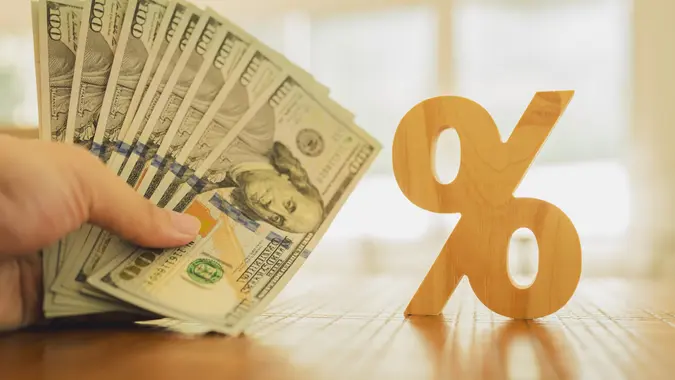Check Your Mail: Tax Rebates and Stimulus Payments May Look Like Junk

Commitment to Our Readers
GOBankingRates' editorial team is committed to bringing you unbiased reviews and information. We use data-driven methodologies to evaluate financial products and services - our reviews and ratings are not influenced by advertisers. You can read more about our editorial guidelines and our products and services review methodology.

20 Years
Helping You Live Richer

Reviewed
by Experts

Trusted by
Millions of Readers
People have been throwing away free money this year — though it’s not necessarily their fault. Residents in California have accidentally tossed out their $1,050 Middle Class Tax Refund checks (the biggest in state history), as GOBankingRates.com reported in early December. And in Houston, news station KHOU noted that many Texas had also mistakenly discarded their $600 stimulus payments. It’s also happened in Virginia, reports the News Leader. And people in those states are not alone.
In all cases, residents have said they assumed the delivery was junk mail or a scam and put the envelope right into the trash or shredder rather than being duped by and wasting their time on possible fraudsters. As NBC News has reported, part of the issue is that many of these checks aren’t checks at all but rather prepaid debit cards, and they’re enclosed in envelopes that look very similar to junk mail. Not to mention the FTC has warned consumers about “refund and recovery” scams that have people on guard.
Sometimes the mail may have a random return address, usually to a Post Office Box, and the plain white envelope has no federal insignia that would make it look like official documents that you’d want to pay attention to. It’s not just state payments either says NBC News, as the IRS has also turned to a similar system of mail.
The Washington Post has noted the government pivoted to debit cards initially during the pandemic in order to speed up payment delivery as people needed the money for essentials as many were strapped of finances due to job loss. There’s also some security in sending mail this way — if it doesn’t look like a check, it’s less likely to be apprehended by thieves who’ve gotten very savvy at check washing and stealing funds intended for other people.
As GOBankingRates.com has reported, thankfully states and the government have call lines if you accidentally dispose of or shred your stimulus payment, assuming it was junk mail. But the issue doesn’t stop there as there are other kinds of checks or refunds that may come your way that could also look nondescript and end up in the trash.
Here’s what to look out for and double-check before tossing, including state stimulus checks as many U.S. states are still planning to send out some in 2023.
Health Insurance Rebate Checks
According to NBC, 8.2 million Americans may get a rebate from their health insurance provider soon. Amounts vary, up to $155 for those with coverage through small employer plans, $78 for large group plans and $141 for those with ACA plans. This is because the government has a “requirement that insurers spend at least 80% of premiums on health-care costs and reimburse policy holders for the difference if they do not meet that threshold.”
Car Insurance Refund Checks
Earlier this year, residents in Michigan were awarded $400 in car insurance refund payments due to a surplus in profits recorded by state insurance agencies. But Midwesterners aren’t the only ones who need to look out for checks from auto and even life insurance companies. If you happen to cancel or change policies, your former provider may send a check for any amount that was paid in advance that wasn’t necessary to cover you through the termination date. You might not get a notice this payment is coming so it’s best to double-check anything from your insurance company.
Credit Card Reward Certificates
If you have a store credit card that provides reward certificates after spending a certain amount of money at their retail locations, like the TJMaxx Rewards card, they may provide the gift as a paper certificate included in your monthly statement. So if you are the type of person to discard your statement without looking at it first, you might want to take notice next time to make sure you aren’t missing out on any extra benefits. Some companies, like TJMaxx, allow you to enroll in digital certificates so you can check the balance online, but you still need to enroll for this service.
Mail-In Rebates
This one can be chalked up to simply forgetting you even sent in the mail-in rebate forms, since the processing time may take a bit to get the money into your hands. When you get something from the brand, whether electronics, pet supplies or some other item you purchased, you might assume it’s just another promo they’re trying to get you to take advantage of, but it could be your rebate. Some brands also partner with external companies to process the rebates so the address may not look familiar at all and could be assumed to be junk.
Bill Pay Checks
If you are perhaps a freelancer or contract worker, some clients may remit payment through a “bill pay” service provided by their bank — this method has them input data into their banking platform and the institution then handles processing and mailing out a check. But it may not be super identifiable as such, especially if it’s a new client and you aren’t expecting to be paid in that manner. It’s best to open up the envelope first just to double-check check especially if you are waiting on an invoice to be paid.
More From GOBankingRates
 Written by
Written by 

























